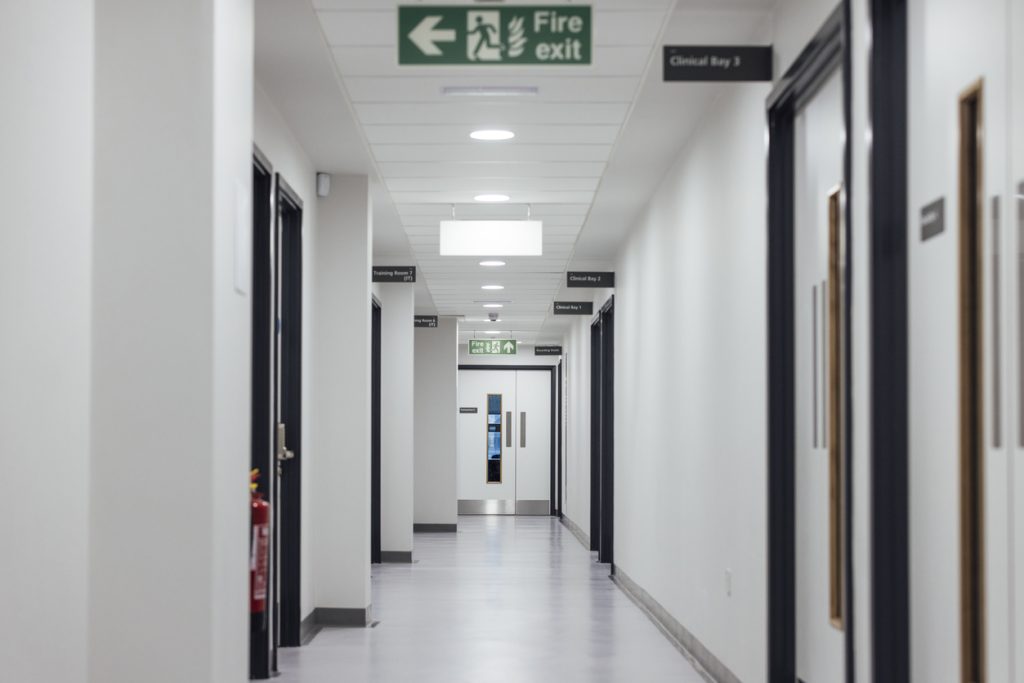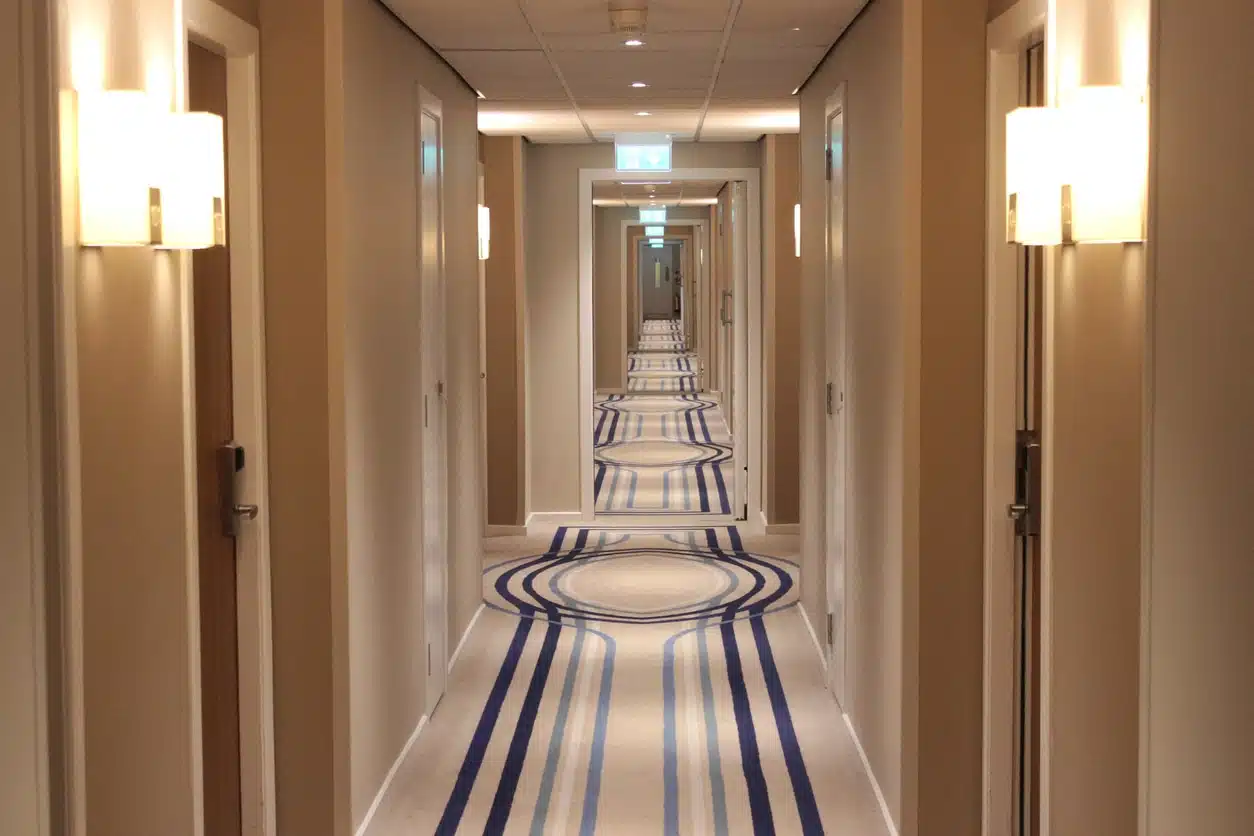Hotels must comply with a range of fire safety regulations. As fire doors play a crucial role in hotels to stop fires from spreading, they must be installed and maintained correctly.
In this guide, you will learn everything about hotel fire doors and the regulations hotels must abide by to ensure fire doors are safe.
The importance of fire doors in hotels
Hotels rely heavily upon fire doors to ensure fire safety. The purpose of fire doors is to contain fire in a room, preventing the spread of fire and smoke throughout the hotel if a fire breaks out.
By providing time to evacuate, these doors can save lives and minimise hotel damage.
Fire doors have a self-closing mechanism, ensuring they remain closed unless physically opened.
Fire door legal requirements
Hotels throughout the UK must adhere to fire safety regulations to ensure the safety of guests:
- England and Wales: The Regulatory Reform (Fire Safety) Order 2005
- Scotland: Fire Safety (Scotland) Regulations 2006
- Northern Ireland: The Fire Safety Regulations (Northern Ireland) 2010
These provide detailed guidelines and specifications for installing and using fire doors. Adhering to these regulations can help prevent the spread of fire and smoke, potentially saving lives and reducing property damage in the event of a fire emergency.
New buildings or those undergoing changes must comply with building regulations depending on their location in the UK:
- England: Approved Documents
- Wales: Building Regulations: Approved Documents
- Scotland: Technical Handbooks
- Northern Ireland: Technical Booklets

Basic hotel fire door regulations
All hotel rooms must have fire doors installed in every habitable room, leading from a stairwell to act as fire compartments to prevent the spread of fire and smoke.
They must be kept closed at all times to prevent the spread of fire and smoke and be fitted with a self-closing mechanism.
Hotel doors must have a fire-resistance rating, signifying their ability to endure fire for a minimum amount of time when properly installed. Hotel fire doors can be FD30 (30-minute protection), FD60 (60-minute protection) or higher.
The frame and ironmongery, including hinges and locks, must also be fire-rated. It’s also crucial to have clear signage on doors and escape routes.

Fire resistance ratings on doors for hotels
Fire doors must resist fire to keep people safe and limit its spread. FD ratings determine how long a door can resist fire, ranging from 30 to 120 minutes. The higher the rating, the longer guests and staff have to evacuate.
Installation and maintenance
Fire doors must be installed by a qualified, competent individual with the necessary expertise in fire safety and door installation.
Proper installation of hotel fire doors is crucial to ensure their effectiveness. It’s important to ensure the door is flush with the frame, leaving no gaps between the frame and the wall.
If there are gaps, flames and smoke can pass through, making them useless.
Fire safety
Building owners or operators must designate a responsible person to manage a building’s fire safety strategy and ensure safe evacuation in case of a fire.
A hotel’s fire safety strategy involves carrying out risk assessments, regular checks of the fire alarm system, checking fire extinguishers and conducting fire drills.
A fire risk assessment determines a building’s fire risk and recommends safety measures or improvements. This includes instructions for fitting fire doors and suggestions for rating and positioning.
Staff should be trained to identify fire risks, understand escape routes and provide regular checks of fire doors, with a trained person responsible for maintenance.

Inspecting and maintaining a fire door
Hotel personnel should be educated to recognise the following:
- Poorly fitted doors in frames
- Damaged doors
- Compromised fire and smoke seals
- Missing or damaged signage
A fire door should never be wedged open and always equipped with a self-closing mechanism.
Inspection checklist
A thorough inspection checklist ensures fire doors comply with safety standards. This includes:
- Evaluating the frame and seals
- Testing of the locks, latches, and hinges
- Assessment of the door’s FD rating
- Measurement of gaps between the door and the frame
If you are uncertain, get help from a professional to conduct a survey.
How to identify a fire door
To identify a fire door, look for a certification mark, such as a label or plug located at the top of the door.
Fire doors can have intumescent or smoke seals around the frame and a door closer. They can also be identified by a blue sign with the words ‘Fire Door’ or ‘Keep Closed’.

Hotel fire door manufacturers
We are a leading manufacturer of doors for hotels, supplying bespoke fire doors throughout the UK.
Our fire doors are certified by BM TRADA, an independent third-party certification body, to ensure a consistently high-quality product.
All of our doors comply with the Building Regulations in England and Wales, Scotland’s Technical Handbook, and the Building Regulations in Northern Ireland.
Traynor Williams is dedicated to surpassing industry standards by providing high-performance hotel doors with the highest fire protection.
We also offer soundproofed hotel doors for bedrooms, conference rooms and other spaces where acoustic doors are needed.
If you would like further information on hotel doors, call us on 0141 445 4640 or contact us using the form below.
Frequently Asked Questions
Is it a legal requirement to have fire doors in hotels?
Yes, it is a legal requirement to have fire doors in hotels. To ensure safe evacuation, fire doors are required by law in all non-domestic buildings, such as hotels, businesses and public facilities.
Do hotel bedrooms need fire doors?
Hotel bedrooms should have fire doors with a self-closing mechanism to ensure fire safety. To ensure safety in guesthouses, B&Bs and self-catering accommodation, it is recommended to have fire doors. However, they are not mandatory.
What is the purpose of fire doors in hotels?
Hotel fire doors aim to prevent the spread of fire and smoke during a fire by acting as a barrier. They should remain closed unless physically opened to ensure the safety of guests and staff.
What are common fire hazards in hotels?
Hotels are prone to fire hazards like cluttered storage areas and faulty electrical appliances. It’s crucial to conduct regular maintenance and keep storage spaces tidy.
